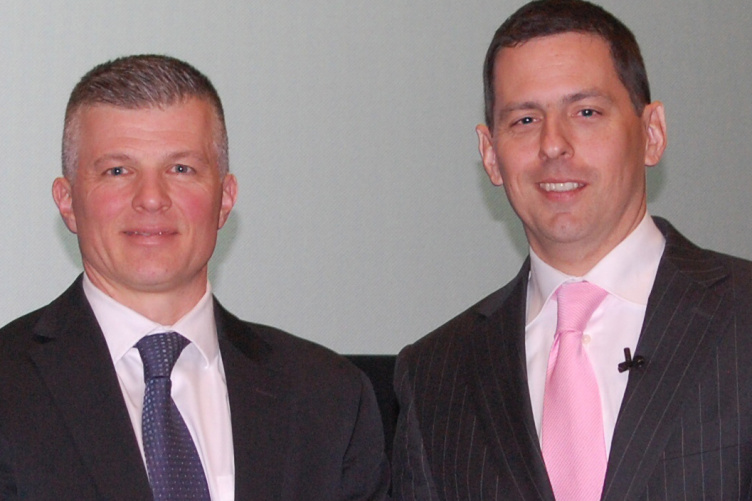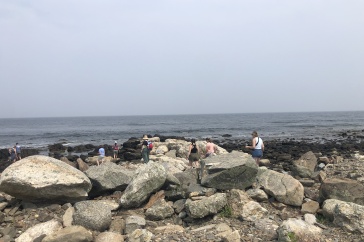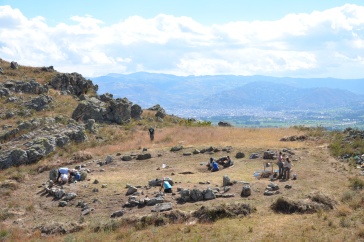
On Nov. 9, 1989, most of the undergraduate students at the University of New Hampshire's campus were not yet born. They did not witness on television the fall of the Berlin Wall or watch as the citizens of East Berlin regained their ability to move freely across their city and country.
The 25th anniversary of this historic event could have gone unnoticed by students if not for several campus events focusing on the fall of the Berlin Wall, including the N.H. International Seminar, "Russia and the West: 25th Anniversary of the Fall of the Berlin Wall."
The series of three lectures, hosted by the UNH Center for International Education and the World Affairs Council of New Hampshire, helped to shed light on that event and examined the relevance of the Cold War issues and politics surrounding the Berlin Wall in current European conflicts.
Col. Scott Dullea '89, director of Russia for the U.S. National Security Council, and Brian Greaney, deputy director of the Office of Russian Affairs in the U.S. Department of State, spoke on Nov. 20 for the last talk in the series, "U.S.-Russia Relations: One crisis. Two Narratives," which focused on the current conflict in the Ukraine.
For several months, pro-Russian separatists have been fighting with Ukrainian forces—more than 4,300 people have died and almost one million have been displaced since the conflict began in April. Currently, the Ukrainian government forces and pro-Russian rebels in eastern Ukraine are upholding a ceasefire. Recently, Russian leaders accused the West of seeking a regime change in Russia—harkening back to Cold War-era politics.
Greaney and Dullea detailed the events that led up to the crisis and showed how U.S. and Russian narratives surrounding the conflict differ.
"Challenges to the international system inevitably have consequences for the American people," Greaney said, "whether that's in economic issues or peace and stability issues."
Dullea added that not only does this conflict touch the lives of those in Ukraine but also the whole international community, and this is why he believes UNH students should pay attention to the crisis.
"I hope that the UNH students recognize that the actions that Russia has taken in Ukraine are destabilizing to the international rules that we've worked hard to establish since the end of World War II," Dullea said. "We've been making great strides toward a Europe whole, free and at peace, and the Kremlin didn't want to play by those rules, and that's what we're seeing in Ukraine."
Gregg Orifici, assistant director of the Center for International Education, wanted to bring Greaney and Dullea here so they could give UNH students a better understanding of Russian affairs.
"We wanted to bring somebody who really had their pulse on the current decision making, and how [the U.S. government] responds to everything from nuclear non-proliferation to the key issue we're looking at that is the crisis in Ukraine," Orifici says. "We wanted UNH students to understand how our foreign policy is not only made, but how it's implemented and what it looks like behind the scenes."
Dullea's role as director for Russia for the National Security Council is to give advice and information to the president so that he can make decisions about Russian affairs. As deputy director of the Office of Russian Affairs, Greaney actively supports Dullea's coordination of Russian policy and manages a team that focuses on Russian affairs for the State Department.
While Dullea also talked about the crisis in Ukraine he wanted to share with UNH students a "window to decision-making in Washington that people don't often understand."
"I hope that [the UNH students] saw that the decision making process is an interagency one where all departments of the U.S. government have a chance to provide input when the president makes decisions," Dullea said.
Greaney also wanted to show that he is "a big believer in transparency in government."
Aside from making students aware of governmental workings, Greaney wanted to make students aware of careers like his at the U.S. Department of State and encouraged students to go explore job opportunities on their website.
"We would be very interested in having the best and brightest from UNH join the Foreign Service and come do what we do," Greaney said.
For Orifici, this semester's theme of the commemoration of the fall of the Berlin Wall is important for students to recognize because it sent "a clear message that the people of Eastern Europe, starting with the German Democratic Republic, were going to have freedom, and that the division of the Iron Curtain was changing."
The two previous lectures were titled "Turbulent Times for East and West: A U.S. Ambassador's Perspective," given by Jack Matlock, former U.S. ambassador to the Soviet Union, and "Pipeline Politics: The Energy Dimensions of U.S.-Russian-European Relations," given by professor and director of the Five College Program in Peace and World Security Studies Michael Klare.
Dullea says the fall of the Berlin Wall is an example of what is at stake with this current crisis in Ukraine.
"One of the things the fall of the Berlin Wall represented is that the people, initially in East Berlin and East Germany but eventually in the whole former Soviet Union, had an opportunity to choose their own future," Dullea said. "And that's what we want to happen in the Russian-Ukrainian crisis as well, for the people of Ukraine to be able to choose their own future, and that's what we're working towards."
Greaney made clear that the actions taken in this conflict create lasting impacts when he showed a photograph taken in Ukraine. In the foreground stood an elderly woman in the street, her face twisted in agony, her hands held up to her face as if she was in Edvard Munch's The Scream. Behind her lay a body in the middle of the road. A white sheet lay on top of it. Only the feet were seen sticking out from underneath.
Greaney concluded his presentation with this image to emphasize for those who might not know much about the issue that there is more to this conflict than "just a different border on the map."
"When we talk about international affairs, we talk on a grand scale about maps and concepts," Greaney said after the lecture. "But at the end of the day what we're talking about are decisions that impact real people."
Recommended Reading
To learn more about the Russia-Ukraine crisis, check out the BBC's Ukraine Crisis page, detailing a deeper history of the conflict through videos, photos, articles and a timeline.
Originally published by:
A version of this article previously appeared in The New Hampshire.
-
Written By:
Michelle Morrissey ’97 | UNH Magazine | michelle.morrissey@unh.edu

















































